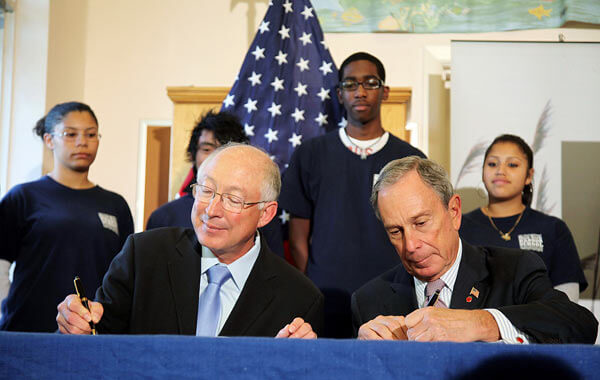By Ivan Pereira
The mayor and the federal government are teaming up to not only restore Jamaica Bay to its original natural state, but also make it a prominent destination for visitors from around the world.
Mayor Michael Bloomberg joined administrators from the National Parks Service, U.S. Department of the Interior and private organizations last Thursday to announce the creation of a partnership and new projects that will improve the quality of bay.
The largest initiative would connect Jamaica Bay with the other ecosystems in the city and create an interconnected network of natural locations, according to the mayor.
“The agreements with our federal, state and philanthropic partners will have … far-reaching benefits for what may be the greatest natural treasure lying within the borders of any city in the nation — Jamaica Bay,” he said in a statement.
The 30-square-mile ecosystem has lost most of its saltwater marshland over the last 70 years and various agencies and groups have been trying to curb the damage. Excess nitrogen in the water, which is discharged into the bay from four nearby wastewater treatment plants, has been killing the greenspace from the roots.
The city Department of Environmental Protection has pledged $100 million till 2020 to upgrade those plants so that they discharge less nitrogen.
In addition to the DEP work, Bloomberg said the federal and state environmental agencies will be working on studies that focus on resilience to climate change in coastal environments and improving park access for the surrounding communities. Those studies will be paid for by grants from National Grid and the nonprofit group the Rockefeller Foundation.
The city Parks Department and National Parks Service, which manages the bay, will be working on the plan to connect the various ecosystems in the city and officials said it will help bring awareness of the ecological issues to a wider audience.
“By coordinating more closely with the city of New York, we will create a seamless network of urban parks that are easily accessible to people who live in nearby communities,” Interior Secretary Ken Salazar said in a statement.
Dan Mundy Jr., a lifelong Broad Channel resident and member of the Jamaica Bay Ecowatchers, said the new partnerships will go a long way toward improving the bay, which is home to 400 species of fish, birds and other animals.
“Now you will have all of these land holder and regulatory agencies coming together and it will be tremendous,” he said.
The partnership has already made some progress.
The U.S. Environmental Protection Agency announced that the bay is an official “No Discharge Zone.” Under the new regulations, boats are banned from dumping sewage into a designated 20,000-acre area.
“This action will improve water quality in this magnificent bay that is right in the backyards of millions of New Yorkers,” EPA Regional Administrator Judith Enck said in a statement.
The city, state and federal governments set up state-of-the-art facilities on the perimeter of the zone where boats can properly discharge their waste, according to the EPA.
Reach reporter Ivan Pereira by e-mail at ipereira@cnglocal.com or by phone at 718-260-4546.



































